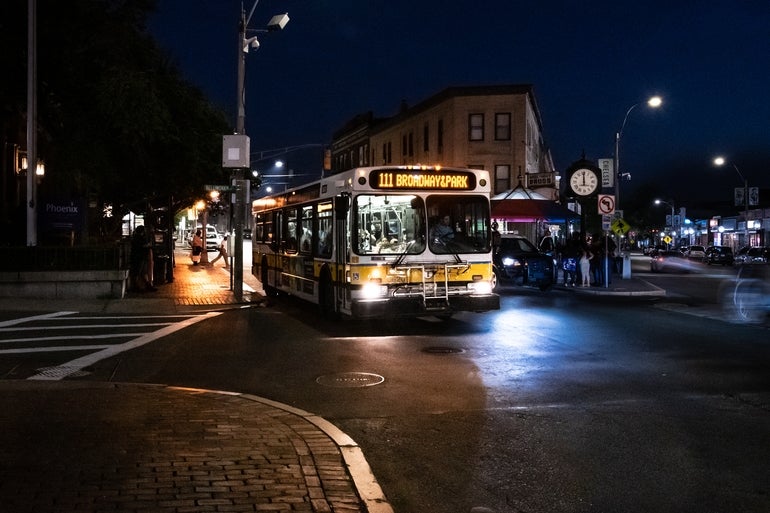Replacing the MBTA’s entire bus fleet with all-electric vehicles will be a key step toward limiting the impacts of climate change, but how exactly the transit authority gets there — and on what timeline — remains a source of debate.
Environmental activists pressed the MBTA to speed up its progress toward clean public transit. But the T must balance those efforts with maintaining and improving its current service, and researchers noted it will cost close to $1 billion just to make infrastructure upgrades that will allow the system to support electric buses.
One of the key challenges for the MBTA, as two of the agency’s managers explained during a Wednesday panel, is that the existing infrastructure is already outdated and insufficient for the diesel and hybrid buses that have been in place for years.
All of the bus maintenance garages are already at or above capacity — the Albany Street garage in Boston tends to 116 vehicles despite being designed to handle 35 — and they will need significant redesigns or replacements to be able to handle electric buses, MBTA Chief Engineer Erik Stoothoff said during the panel discussion.
The goal, he said, is to make improvements to facilities now so that switching over to electric buses can be a “one-to-one swap” years away.
“Electric or otherwise, the maintenance facilities need investment,” Stoothoff told reporters after the event. “We’re planning on what that investment is going to look like that can support the fleet we have today and the evolution of that fleet from diesel to hybrid to battery electric.”
One option to balance those needs, suggested by the A Better City organization that convened experts and officials for Wednesday’s event, would be to pursue mixed-use developments for future MBTA service garages.
In a report released alongside the panel discussion, ABC researchers used the Albany Street garage as a case study to conclude that combining an electric-equipped maintenance facility with residential or retail properties could help accelerate necessary investment. That could be key, said co-author Glen Berkowitz, because of the high price tag over the next decade to improve bus facilities to allow for electrification.
“There’s about $1 billion plus that we as a society here in the Boston metro region have to find in the next 13 years to rebuild or replace all of our bus maintenance facilities,” Berkowitz said. “It’s largely unfunded.”
Although the Baker administration’s own Commission on the Future of Transportation report that suggested moving the entire fleet to electric or zero-emissions vehicles by 2030, the on-paper progress toward electrification lags several other major areas. Los Angeles, New York City and Seattle have all fully committed to 100 percent electric buses.
Even those pale compared to China, which currently operates 99 percent of all public electric buses worldwide, according to World Resources Institute Senior Global Manager for Electric Vehicles Camron Gorguinpour.
The MBTA last week introduced the first of five battery electric buses that will run on the Silver Line as part of a pilot program, and there are also plans in place to add another 194 hybrid buses on top of the more than 200 already in service.
Another challenge is that electric buses have higher initial price tags for shorter ranges. Figures presented by MBTA Director of Vehicle Engineer William Wolfgang indicated a single battery electric bus could cost as much as $200,000 more for about 100 to 200 fewer miles per charge.
Stoothoff said officials plan to study how the current battery-powered vehicles that are being piloted perform during the winter, when electric vehicles typically lose range because of the additional power used to heat the vehicle, before deciding on the exact next steps.
“We want to see how many miles those buses will be able to achieve and if we can run a battery electric bus for a full day supporting the service we want to deliver,” he said.
But given the scale of the climate crisis — and the fact that roughly 40 percent of all greenhouse gas emissions in Massachusetts come from transportation — activists are pushing for the MBTA to ramp up the speed of its investment.
Veena Dharmaraj, a program manager for the Sierra Club’s Massachusetts chapter, said in a presentation at Wednesday’s event that transitioning the MBTA to electric buses would save 55,000 tons of carbon emissions each year, the equivalent of more than 6,500 homes annual energy use or 6.1 million gallons of gasoline consumed.
“Vehicle electrification is the single most powerful strategy we have available to us today to curb emissions from the transportation sector,” she said.

